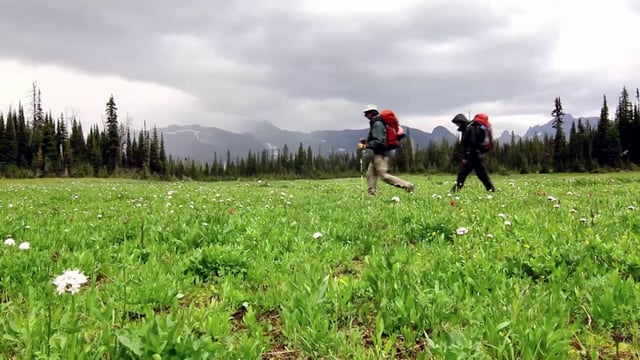
[quote_box_right]For more information, visit wayofstjamesmovie.com[/quote_box_right]
One year after 10 local Catholic men ventured to Spain, a documentary about their life-changing pilgrimage held a packed theater spellbound.
Catholics from across the diocese amassed at Harkins Theater in Scottsdale July 19 for the prescreening of “Footprints,” a documentary directed by Juan Manuel Cotelo.
Cotelo, a Spanish filmmaker whose earlier works caught the attention of then-Cardinal Jorge Bergoglio, was approached by Fr. Segio Fita, pastor of St. Anne Parish in Gilbert, and agreed to make the 90-minute documentary.
It wasn’t easy. Cotelo and his crew accompanied the pilgrims on their nearly 600-mile trip along the Way of St. James, better known as the Camino. The pilgrimage, popularized by the 2010 film “The Way” starring Martin Sheen, is actually a network of trails that cross through Spain and end in Compostela where the remains of St. James the Apostle are buried.
Thousands of people have made the journey over the last several centuries, including St. Francis of Assisi, who made the trip in 1214, some 800 years before the men from Arizona took their steps along the winding paths.
Fr. Fita said the criterion for choosing the route came down to beauty. “We wanted something that would put us in contact with nature,” he said. While about 80 percent of pilgrims choose a different trail, Fr. Fita and his group took the northern road that began near the border of France and Spain.
As the film unfolds, viewers are captivated by the rocky cliffs, emerald-green meadows and wildflowers. The men, who have prepared for the pilgrimage by hiking South Mountain and the Grand Canyon, appear confident at first. Fr. Fita places a necklace with the iconic conch, symbol of the Camino, around each pilgrim’s neck.
The 10 men, who were all on hand for the July 19 prescreening, are an eclectic bunch and include a former college football player and Zumba instructor, a mechanic, a seminarian and a recovering drug and alcohol addict among others. In the opening scenes of the film, they’re clearly excited about the journey as they stride along, gripping their walking sticks.
A local Spanish bishop caught sight of them and Cotelo captured his thoughts. Soon enough, they’ll find out, the bishop says, and the smugness and naïveté will vanish. “The first time they encounter suffering, it’s traumatic.”
By the second day of their pilgrimage, they’ve got blister-covered feet and sore knees. One is temporarily sidelined by gastroenteritis and another struggles with asthma. Up steep, rocky paths, the pilgrims press on, fingering their rosary beads, pausing for Mass each day, often outdoors. With hundreds of miles left to go, many wonder if they’ll ever make it to Compostela. They hope to be there by July 25, in time for the feast of St. James.
Along the way, they learn many lessons. “Whatever life throws at you, you have to keep walking,” one man says.
“Suffering is important to a pilgrimage,” Fr. Fita tells the group. “Difficult moments must not overcome us — we must overcome them.”
The pilgrims hike an average of 20 miles a day, often logging even more, all with substantial backpacks. They visit a convent of Poor Clares and a church where they venerate a piece of the Cross of Christ. “We’re exploding with joy,” one pilgrim says in the film. Transformed by the encounter, the men’s bond of brotherhood deepens as they decide to walk more closely united, taking turns as leader, pushing each other up hills. They walk the final miles of their journey barefoot.
“I never heard them complain,” Cotelo told The Catholic Sun. “They served each other. I want to have their spirit of service.”
Cotelo’s other films have been seen in more than two dozen countries. “We’re not Disney,” he told the crowd at Harkins. “We don’t have millions of dollars. You have created something spectacular to spread throughout the world.” He encouraged them to promote the film through social media and word of mouth.
Parishioners at St. Anne provided much of the support for the documentary, but there was also a grant through The Catholic Community Foundation’s Catholic Leadership Circle. Ryan Hanning, director of cultural advancement at University of Mary-Tempe, is also a member of CCF’s Catholic Leadership Circle. Hanning said the group desires to support efforts it considers “mission critical,” in that they help bring about the New Evangelization.
One of the pilgrims, Pedro Gutierrez, spoke to the Catholic Leadership Circle about funding for “Footprints.”
“It seemed to make absolute sense,” Hanning said. “What we want to do here in Phoenix is to articulate the goodness of God and the beauty of the world around us,” Hanning said.





